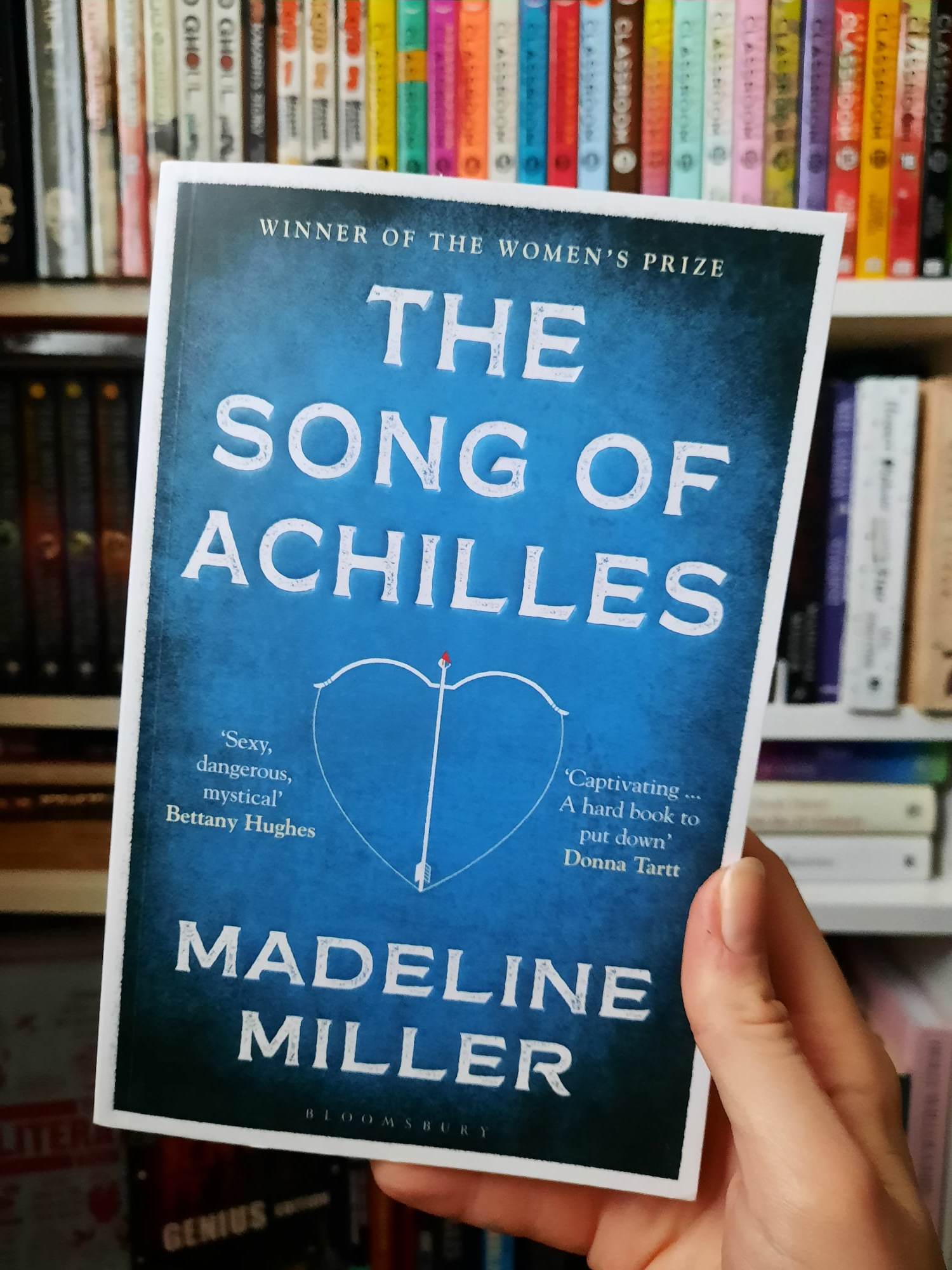The Song of Achilles by Madeline Miller has recently taken the world – well, avid readers on TikTok and YouTube – by storm. This is despite the book having been first printed in 2012. Having seen so many raving recommendations over the last 12 months, I had to find out for myself what all the fuss was about; I grabbed a copy and dug in…
Disclaimer: I’ve tried to keep this post free from spoilers as much as possible, whilst still providing an accurate review. I cannot guarantee that no spoilers have slipped through, so read at your own risk!
Background
The Song of Achilles, based on the tales within Homer’s The Iliad, follows the story of the Greek demigod, Achilles, through the war of Troy. Interestingly, Miller retells the story from the perspective of Achilles’ companion, Patroclus. I’m a sucker for books like this: retellings of classic literature; reworked stories of legend and mythology. I loved Rick Riordan’s Percy Jackson books, so had a strong feeling that I would enjoy The Song of Achilles, too (I was right).
I went into this book having not read The Iliad and (I’m somewhat ashamed to say) not knowing anything about Achilles, Patroclus OR Troy – besides having an awareness of Achilles’ weakness in his heel (thanks to the well-known phrase, Achilles heel). Let me reassure you that prior knowledge is not a prerequisite for enjoying this book. The writing is incredibly accessible: despite the number of characters and complex names, Miller gives clear and concise explanations of characters’ relationships to each other, making it easy to follow. I suppose this reflects the target Young Adult audience, but don’t be put off by this classification – the novel’s themes certainly keep it entertaining for a mature reader, too.
It’s a credit to the story-writing that I finished the book gripped with inspiration to learn about the figures, legends and time period it’s based on. That’s right: this book made me wish I had studied Classics and Ancient History during my years in education. Upon finishing, I immediately took to Google to research the legends of Achilles, Troy and the Greek Gods. I’m even considering reading Homer’s The Iliad – that’s some powerful writing!
Best bits
Plot & characterisation
Plot forms the basis of any novel, and is key to holding everything together. It’s difficult to discuss the plot without spoilers, but I can say this: The Song of Achilles is ultimately a story about love, determination and the strength of human connection.
Although a romantic love story forms a central element of the novel, it’s not all-consuming: love and lust are portrayed elegantly and eloquently, and fit naturally within the novel without taking over. Miller has carefully and skilfully created a well-balanced plot with complex themes and character development which is really refreshing. To have portrayed the story as purely a romance would have defeated its effectiveness; by not shying away from the reality of battle and wartime culture, the reader gains a well-rounded view of what life would have been like in such times of violence and desperation.
Relatability
One of the reasons this book has resonated with such a large audience is its relatability. History books successfully “Other-ise” the figures of legend; naturally focusing on facts and achievements over personality. Miller did a great job of bringing the classic tale into the 21st century; humanising the characters of legend by making their speech, mannerisms and personal struggles relatable. By bringing them to life as three-dimensional characters, and showing the vulnerable and flawed aspects of even Achilles, Miller makes these figures – usually so distant and foreign – realistically human and relevant to a modern audience.
At its heart, The Song of Achilles is a coming-of-age story – a universal period which connects us all. Despite the novel being set within the Greek Heroic age of war and violence – a culture startlingly different from our own – through carefully constructed characters and themes, Miller showcases that as humans, we all experience the same emotions and struggles as we mature. It’s a beautiful message which will resonate with everyone who reads it.
Writing style
The plot is fast-paced and engaging, making it a quick read. What made this book really stand out for me was the style in which it is written. I love the way that Miller uses certain words and then explains their meaning. For example:
‘“You chose her,” he says. “Over me.”
Direct quote from Madeline Miller’s, The Song of Achilles.
“Over your pride.” The word I use is hubris. Our word for arrogance that scrapes the stars, for violence and towering rage as ugly as the gods.’
I thought this was such a clever way of making the novel accessible to a wider range of readers. Rather than using overly complicated, archaic words and metaphors, Miller showcases her writing skill through beautiful phrasing (many now saved on my phone for future reference!).
‘At first it is strange. I am used to keeping him from her, to hoarding him for myself. But the memories well up like spring-water, faster than I can hold them back. They do not come as words, but like dreams, rising as scent from the rain-wet earth. This, I say. This and this.’
Direct quote from Madeline Miller’s, The Song of Achilles.
Niggles
My only comment is that the story feels a little unfinished – we never hear what happens to Helen of Sparta (who was the cause of the war of Troy). I understand why that choice was made: as the novel is narrated from Patroclus’ point of view, and he never found out what happened with Helen, it makes sense that his audience don’t either. The novel comes to a natural ending without that information, yet I still find it a little annoying.
I think my dissatisfaction stems from the fact that I had no prior knowledge to fill in the gaps. I suppose it’s a positive thing that the novel inspired me in its story-telling so much so that it left me wanting to learn more about the legend to understand “what happened next”.
Final thoughts
The Song of Achilles is a great book and I highly recommend it. I love that for a Young Adult novel, the plot is realistic: not overly positive or painted with a soft edge, but filled with realistic portrayals of the brutality of war, the frustration and suffering it brings, and the strengths and weaknesses of human nature. Covering timeless themes that will resonate with most readers, this novel will continue to be popular – and, I don’t doubt, the subject of many English Literature essays – for years to come.


Leave a Reply